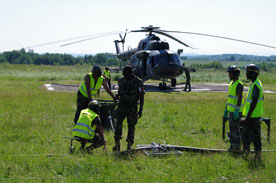The ''fuel soldiers''
"Fuel soldiers" have an essential mission: to supply and support the forces deployed to an operation wherever and whenever needed. Many factors have to be taken into account for operational effectiveness. Developing multinational fuel logistics capabilities is also a priority, aimed at reducing the logistical footprint and the cost of operations. France is leading one such multinational project.

"Aviation fuel requires greater safety measures than ground fuel," says Captain Jean-Luc Soubelet, desk officer for the operations office of the French Army's inter-staff fuels base. "The solid particles must be removed, as well as any water dissolved in the fuel that might obstruct the aircraft's fuel lines and kill the engine, with the consequences that one can imagine."
Water in the fuel may be less critical when refuelling land vehicles but it is still problematic. "For example, in theatres where the winters are especially cold, such as Kosovo and Afghanistan, if the personnel do not make sure to purge the fuel tanks of their vehicles regularly, the water could freeze and prevent them from starting," adds Captain Soubelet.
In theatres of operations, fuel support reflects a number of necessities, such as forward refuelling in remote locations or unsecured areas. "Helicopters play a key role in this because they transport fuel bladders and allow the equipment to be refuelled very quickly. The shorter the time we're in the field, the lower the risk."
Equipment can also be fitted out with self-defence capabilities, such as armoured cabs and rocket defence systems, to protect convoys and personnel from attacks.
To simplify fuel logistics in an operation and thereby make it safer, for the past several years Allied forces have used a single fuel – aviation fuel, or F-35, a NATO standard – for both aircraft and land vehicles. Aviation fuel offers the advantage of being available everywhere in the world because, unlike other types of fuels, it has an international specification.
The French connection

France, through its military fuels service (Service des essences des armées, or SEA), has recognised know-how and broad experience in fuel support to forces in both national and multinational operations, including in Kosovo, Chad and Mali.
Experience has shown that the ability to adapt logistics to changing requirements and to coordinate properly among participating nations is key to success. Moreover, multinational capabilities are more cost-effective, which is a priority in times of financial austerity.
"Smaller defence budgets mean that in future one nation, on its own, will not be capable of providing logistics support to a coalition," says Colonel Olivier Görlich, Chief of the Operational Support and International Relations Office of the central directorate of the SEA.
The French General Staff has tasked the SEA with directing NATO's Smart Defence project on fuel logistics – one of 22 multinational projects approved by the Allies at the Chicago Summit in May 2012.
The general idea of the project is to promote sustainable mutual cooperation by volunteer nations to allow combined fuel support solutions to be implemented in a theatre of operations. In practical terms, it involves developing and testing best practices or common procedures for efficient multinational support using resources from different contributors.
Smart fuel support
"For now, a small number of nations are working together on the project," explains Colonel Görlich. "The aim is to develop ideas, and then make a pre-identified group of nations available to NATO that together can provide fuel support to a coalition, either as a framework nation or as a simple contributor.
“The approach is innovative because the full spectrum of operational fuel support is being considered – from technical, administrative and financial aspects to command and control," he adds.
The training portion of the project is being co-directed by the Prague-based Multinational Logistics Coordination Centre, which organised Exercise Capable Logistician 2013 in Slovakia in June. The exercise provided an opportunity for Captain Soubelet to test out a new, innovative multinational approach to pooling fuel resources for a coalition.
"Pooling the resources decreased the burden that one nation would have to bear if it had sole responsibility for fuel support. This is fully in line with Smart Defence," says Captain Soubelet. "The exercise also allowed us to test common procedures and set out a clear breakdown of responsibilities for each of the nations."
He is convinced that this Smart Defence project will enable the Alliance to reduce its logistical footprint, be more effective and cut the costs of coalition fuel support.
